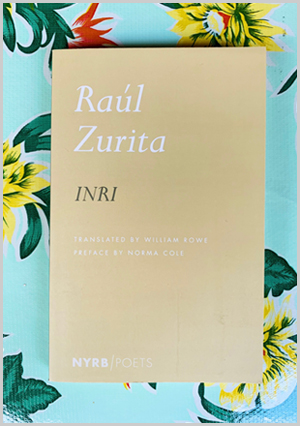Claire recommends INRI by Raúl Zurita, translated from the Spanish by William Rowe:
 My first foray into the NYRB Poetry series and into the work of Chilean poet Raúl Zurita, and let me say: I’m entranced. Here is a poet who is simultaneously invested in the evolution of the soul, and in exposing the violent inhumanity of the political history of his native land, Chile.
My first foray into the NYRB Poetry series and into the work of Chilean poet Raúl Zurita, and let me say: I’m entranced. Here is a poet who is simultaneously invested in the evolution of the soul, and in exposing the violent inhumanity of the political history of his native land, Chile.
In the Introduction to INRI, we learn that on the morning of September 11, 1973, the armed forces of Chile overthrew its socialist government, establishing General Augusto Pinochet at the head of a military dictatorship. Zurita—then only 22 years old—and thousands of others were herded into the National Stadium in Valparaíso. Zurita was later tortured, but eventually let go. During those years, thousands of Chileans “disappeared,” never to be seen or heard of again, while the authorities remained silent.
Though many Chileans emigrated, Zurita chose to stay in Chile, enduring the ruthless seventeen-year dictatorship. “I had to learn how to speak again from total wreckage, almost from madness, so that I could still say something to someone,” Zurita writes in a note at the end of INRI.
Fast-forward to January 8, 2001, when social-democratic President Ricardo Lagos made public some information pertaining to those still unaccounted for in the government-sponsored killings during the 1970s: these missing people had been kidnapped by militant forces, their eyes gouged out, and their bodies thrown from helicopters “into the ocean, the lakes, and the rivers of Chile” as well as the Atacama Desert in the north. After this announcement, reports and additional evidence started surfacing, and a kind of collective grief began to solidify in the memory of the people of Chile who lost loved ones, neighbors, friends to the senseless violence that marked that time in the country’s history.
It is from this tragic experience that INRI was born as a lament for the dead, and though it is heavily steeped in this set of circumstances, the poetry itself reads like a kind of disembodied incantation coming from the voices of the disappeared. The poems also move in and out of the voices of Chile’s landforms, divorcing the mountains, glaciers, oceans and deserts from the idea of a national ownership, just as the dead bodies of the disappeared were returned to a kind of nationlessness as they were thrown to their deaths.
But if the poetic sequences in INRI can be said to have a “speaker,” it is that of a vast and all-knowing entity like some form of the divine; it knows not only the sordid secrets that plague Chile’s history, but it knows the myriad internal experiences held in the minds of the disappeared, the dead, what occurs in silence, in isolation, at the bottom of the ocean, underneath the heaps of snow on the Andes, mechanisms at work at the atomic level.
This omnipotent voice moves in patterns, and one of the most compelling things about Zurita’s writing in INRI is the hymn-like repetition of words and phrases that accumulate like falling snow. But the repetition is not quite that; the words mutate and change completely each time they reappear. This snow heap of language gets lit up in every different perceivable color, viewed from all angles, including from inside its frozen core from which the voices of the dead speak.
But what was absolutely indispensable to me as a reader of poetry, and as a poet myself, the biggest and most triumphant quality of Zurita’s spirit as a poet is that the sequences in INRI culminate in a mantra of love, love that is so persistent, it survives the petty political contrivances of humanity, no matter how destructive they are, love that, even in the face of death and loss on a national scale, flows in the background of every terrible moment like the undulating lyric of ocean waves.
Reading this book during a time of quarantine has been a truly transformative experience, and I think the highest honor I have felt as an isolated creature has been this book’s reminder of my own empathic emotional self, that disembodied voice permissioning me to feel the full forces of grief and love, even in a state of isolation.
